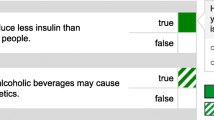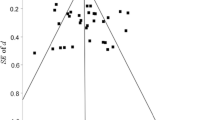Abstract
The present study is part of a project aiming at empirically investigating the process of modeling the partner’s knowledge (Mutual Knowledge Modeling or MKM) in Computer-Supported Collaborative Learning (CSCL) settings. In this study, a macro-collaborative script was used to produce knowledge interdependence (KI) among colearners by providing them with different but complementary information. Prior to collaboration, two students read the same text in the “Same Information” (SI) condition while each of them read one of two complementary texts in the “Complementary Information” (CI) condition. After the collaboration phase, a knowledge modeling questionnaire asked participants to estimate both their own — and their partner’s outcome knowledge thanks to Likert-type scales. The relation between the accuracy with which co-learners assess their partner’s knowledge and learning has been examined. In addition, we investigated the KI effect on (a) learning performance and (b) the MKM accuracy. Finally, we wondered to what extent the MKM accuracy could mediate the KI effect on learning. Results showed no difference in learning performance between participants who worked on same information and participants who worked on complementary information. We also found that participants were more accurate at assessing their partner’s knowledge in the SI condition than in the CI condition. The discussion focuses on methodological limitations and provides new directions for investigating the KI effect on MKM accuracy.
Résumé
Cette étude s’inscrit dans un projet qui étudie le processus de modélisation des connaissances du partenaire (Modèle Mutuel ou MM) dans des situations d’apprentissage collaboratif médiatisé par ordinateur. Dans cette expérience, un script collaboratif a été utilisé qui consistait à introduire une interdépendance des ressources (IR) entre deux étudiants. Avant de collaborer, soit les étudiants lisaient le même texte (‘Informations Identiques’), soit chacun lisait un des deux textes complémentaires (‘Informations Complémentaires’). Après la collaboration, les étudiants estimaient leur propre niveau de connaissances ainsi que celui de leur partenaire. Nous nous intéressons à la relation entre l’apprentissage et la précision du MM. Nous étudions également l’effet de l’IR sur (a) les performances individuelles d’apprentissage, et (b) la précision du MM. Nous nous demandons enfin dans quelle mesure la précision du MM peut constituer une variable médiatrice de l’effet de l’IR sur l’apprentissage. Aucune différence de performance n’a été observée entre les deux conditions. Les résultats montrent par ailleurs que le MM est plus précis dans la condition ‘Informations identiques’ que dans la condition ‘Informations Complémentaires’. La discussion se centre sur les limites méthodologiques de l’expérience et apporte de nouvelles perspectives quant à l’étude de l’effet de l’IR sur la précision du MM.
Similar content being viewed by others
References
Baron, R.M., & Kenny, D.A. (1986). The moderator-mediator variable distinction in social psychological research: Conceptual, strategic, and statistical considerations.Journal of Personality and Social Psychology, 51(6), 1173–1182.
Bromme, R., Jucks, R., & Runde, A. (2005). Barriers and biases in computer-mediated expert-layperson-communication. In R. Bromme, F.W. Hesse, & H. Spada (Eds.),Barriers, biases and opportunities of communication and cooperation with computers and how they may be overcome (pp. 89–118). New York: Springer.
Buchs, C., & Butera, F. (2001). Complementarity of information and quality of relationship in cooperative learning.Social Psychology of Education, 4, 335–357.
Buchs, C., Butera, F., & Mugny, G. (2004). Resource interdependence, student interactions and performance in cooperative learning.Educational Psychology, 24(3), 291–314.
Chi, M.T.H., Siler, S., & Jeong, H. (2004). Can tutors monitor students’ understanding accurately?Cognition and Instruction, 22, 363–387.
Clark, H.H., & Murphy, G.L. (1982). Audience design in meaning and reference. In J.-F.L. Ny & W. Kintsch (Eds.),Language and comprehension. New York: North Holland.
de Vries, E., Lund, K., & Baker, M. (2002). Computer-mediated epistemic dialogue: Explanation and argumentation as vehicles for understanding scientific notions.Journal of the Learning Sciences, 11(1), 63–103.
Dillenbourg, P. (1999). What do you mean by collaborative learning? In P. Dillenbourg (Ed.),Collaborative learning: Cognitive and computational approaches (pp. 1–19). Oxford: Elsevier.
Dillenbourg, P., & Jermann, P. (2007). Designing integrative scripts. In F. Fischer, H. Mandl, J. Haake, & I. Kollar (Eds.),Scripting computer-supported collaborative learning — Cognitive, computational, and educational perspectives (pp. 275–301). Computer-supported collaborative learning series. New York: Springer.
Fitzgerald, J.T., White, C.B., & Gruppen, L.D. (2003). A longitudinal study of self-assessment accuracy.Medical Education, 37, 645–649
Horton, W.S., & Gerrig, R.J. (2005). Conversational common ground and memory processes in language production.Discourse Processes, 40(1), 1–35.
Krauss, R.M., & Fussell, S.R. (1991). Perspective-taking in communication: Representations of others’ knowledge in reference.Social Cognition, 9, 2–24.
Lambiotte, J.G., Dansereau, D.F., O’Donnell, A.M., Young, M.D., Skaggs, L.P., Hall, R.H., & Rocklin, T.R. (1987). Manipulating cooperative scripts for teaching and learning.Journal of Educational Psychology, 79, 424–430.
Mac Iver, D. (1987). Classroom factors and student characteristics predicting students’ use of achievement standards during ability self-assessment.Child Development, 58, 1258–1271.
Molinari, G., Sangin, S., Nüssli, M.A., & Dillenbourg, P. (2008). Effects of knowledge interdependence with the partner on visual and action transactivity in collaborative concept mapping. In G. Kanselaar, J. van Merriënboer, P. Kirschner, & T. de Jong (Eds.),Proceedings of the International Conference of the Learning Sciences (ICLS 2008) (pp. 91–98). Utrecht, The Netherlands: ICLS.
Nickerson, R.S. (1999). How we know — and sometimes misjudge — what others know: Imputing one’s own knowledge to others.Psychological Bulletin, 125(6), 737–759.
Nova, N., Wehrle, T., Goslin, J., Bourquin, Y., & Dillenbourg, P. (2007). Collaboration in a multi-user game: Impacts of an awareness tool on mutual modeling.Multimedia tools and Applications, 32(2), 161–183.
Nückles, M., & Stürz, A. (2006). The assessment tool. A method to support asynchronous communication between computer experts and laypersons.Computers in Human Behavior, 22(5), 917–940.
Pickering, M., & Garrod, S. (2004). Toward a mechanistic psychology of dialogue.Behavioral and Brain Sciences, 27, 169–226.
Roschelle, J., & Teasley, S. (1995). The construction of shared knowledge in collaborative problem solving. In C.E. O’Malley (Ed.),Computer Supported Collaborative Learning (pp. 69–97). Heidelberg: Springer-Verlag.
Sangin, S., Molinari, G., Nüssli, M.A., & Dillenbourg, P. (2008a). How learners use awareness cues about their peer’s knowledge? Insights from synchronized eye-tracking data. In G. Kanselaar, J. van Merriënboer, P. Kirschner, & T. de Jong (Eds.),Proceedings of the International Conference of the Learning Sciences (ICLS 2008) (pp. 287–294). Utrecht, The Netherlands: ICLS.
Sangin, M., Molinari, G., Dillenbourg, P., & Nüssli, M.A. (2008b).I know what you know: The mediating effect of the partner’s knowledge modeling on distant collaborative learning performance in dyads. Manuscript submitted for publication.
Schober, M.F., & Brennan, S.E. (2003). Processes of interactive spoken discourse: The role of the partner. In A.C. Graesser, M.A. Gernsbacher, & S.R. Goldman (Eds.),Handbook of discourse processes (pp. 123–164). Mahwah, NJ: Lawrence Erlbaum Associates.
Van den Bossche, P. (2006).Minds in teams: The influence of social and cognitive factors on team learning. Unpublished doctoral dissertation. Maastricht University, Maastricht, The Netherlands.
Wegner, D.M. (1995). A computer network model of human transactive memory.Social Cognition, 13, 1–21.
Wittwer, J. (2005).Improving instructional explanations in netbased communication between experts and laypersons. Unpublished doctoral dissertation, Freiburg University, Freiburg, Germany.
Author information
Authors and Affiliations
Corresponding author
Additional information
The research that is reported here has been funded by the Swiss National Foundation for the Scientific Research (subside number 105513-106940).
Rights and permissions
About this article
Cite this article
Molinari, G., Sangin, M., Dillenbourg, P. et al. Knowledge interdependence with the partner, accuracy of mutual knowledge model and computer-supported collaborative learning. Eur J Psychol Educ 24, 129–144 (2009). https://doi.org/10.1007/BF03173006
Received:
Revised:
Issue Date:
DOI: https://doi.org/10.1007/BF03173006




